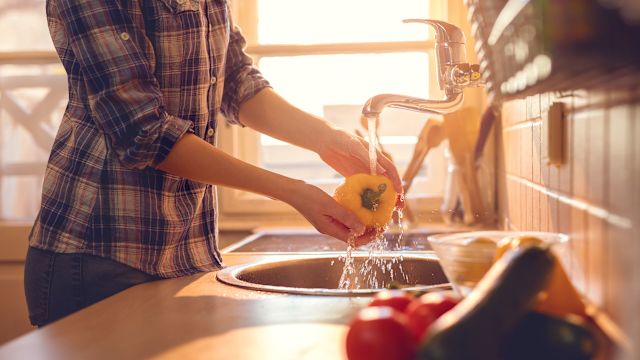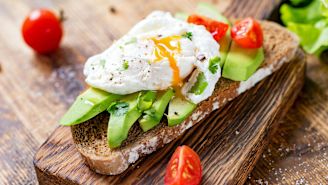Updated on February 20, 2024.
Getting food poisoning is obviously not fun—and it’s often difficult to figure out what made you sick. But there are ways that you can keep yourself safe from foodborne illnesses, especially Escherichia coli (E. coli). A lot of it comes down to the way you wash your produce.
Here’s how you can get sick from E. coli in the first place, plus how a dietician keeps her produce and kitchen sanitary.
How you get sick from E. coli
We all have some healthy forms of E. coli living in our bodies. Before you become squeamish, remember that bacteria can actually be beneficial when it helps your body maintain a healthy digestive tract.
“There's a lot of different strains of E. coli. There are really only a few that are dangerous,” says Robin Foroutan, an Integrative Dietitian Nutritionist spokesperson for the Academy of Nutrition and Dietetics.
The particularly dangerous one that can make you sick is O157:H7. This strain lives in the intestines of farm animals including cattle, sheep and goats, and we encounter it in more ways than you might realize.
Ground beef can become tainted with E. coli if bacteria from animal intestines comes into contact with meat. E. coli can also live on a cow’s udders, so if you choose to drink milk which is not pasteurized, you may put yourself at risk of infection.
This harmful strain of E. coli can also make its way into produce when water sources that are contaminated with animal or human feces are used to irrigate crops. Some vegetables that are commonly impacted include sprouts, lettuce, tomatoes and spinach. E. coli can even taint drinking water and swimming pools.
E. coli can be spread by human error as well. In many cases, infection occurs when someone doesn’t wash their hands properly before handling food or if meat is undercooked.
(Note that O157:H7 infection differs from enterotoxigenic E. coli, also known as ETEC or traveler’s diarrhea. Food and water can be contaminated with this bacteria from human or animal feces. It most commonly affects children living in developing countries and people traveling abroad.)
E.coli infection symptoms
Symptoms of E. coli infection include abdominal pain, diarrhea, and vomiting, which last anywhere between 5 to 10 days. Keep in mind that most people don’t get a fever, and if they do, it’s low. Symptoms usually present anywhere from 12 to 24 hours after being exposed, but there is a 10-day window when it’s still possible to become sick. Children can continue to infect anyone who comes into contact in their stool up to two weeks after they’ve gotten better.
Unfortunately, once you’re infected, there’s not much you can do besides staying hydrated and getting rest. “You could take an electrolyte formula as well, or even just put a pinch of salt into your water and drink that,” says Foroutan.
You should see a healthcare provider (HCP) if your symptoms last longer than two days or include you having a severe reaction, such as bloody diarrhea or uncomfortable abdominal pain. Antibiotics don’t work except for in some of those severe cases.
How to prevent E. coli
You can take simple steps to protect yourself from E. coli infection. Here are some ways to keep your stomach happy and healthy.
Clean your hands
Before you handle produce, make sure you’ve washed your hands with warm water and soap for at least 20 seconds. A helpful way to know you’ve washed long enough is to sing the alphabet. This is especially important if you handle dirty diapers or have recently petted animals, especially at a the zoo.
Wash produce correctly
“You can also have contamination with amoebas and protozoas and different kinds of microscopic parasitic organisms, so it's always a good idea to give your produce a nice rinse for about 30 seconds,” says Foroutan. The temperature of the water doesn’t matter, necessarily. Instead of running the produce under the faucet, try leaving it in a large bowl or agitating it in a salad spinner. After you remove the produce from the water, dry it with a clean paper towel or cloth.
Sprouts are a rare exception to this rule. Washing them won’t remove the bacteria—you either have to cook them or just not eat them to avoid the bacteria.
Wash fruits and veggies with a peel
Yes, even ones you are going to peel. “You really ought to wash everything really well, even things like melon,” says Foroutan. If there is E. coli bacteria on the rind, then your knife can push it into the flesh, contaminating the inside from the outside.
Remember pre-packaged veggies can be dirty
You might think pre-packaged, or bagged lettuce is already clean and ready to eat. “It's tempting to skip the washing step, but it's still important to do that,” says Foroutan. Check the label to see if the produce is pre-washed.
Buy a vegetable brush
Yes, there’s such a thing as a vegetable brush. For vegetables with a peel, you can use a brush to lightly scrub the outside. If you're getting produce straight from the farm, you might have to wash and brush it a few times to get all the sand and the dirt off. After brushing it, run it under water for around 30 seconds. “That works well for carrots, squashes, winter squash, where you're not necessarily eating the outside,” says Foroutan.
Cook meat thoroughly
Ground beef should be at least 160 degrees Fahrenheit before being served. If your hamburger looks undercooked at a restaurant, send it back.
Avoid certain foods
Foods which aren’t pasteurized (milk, ciders, and soft cheeses) are considered risky and should not be eaten.
While getting E. coli is a scary risk of eating certain foods, in many instances, it can be prevented.






